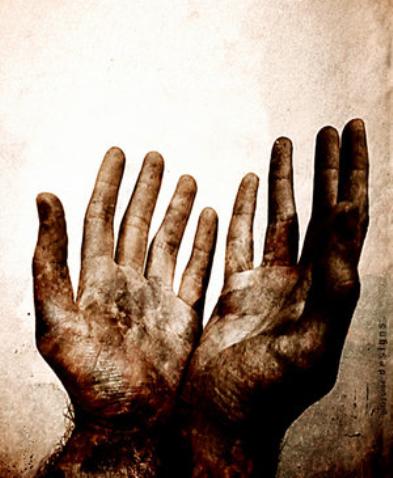Unless I see the nail marks in his hands and put my hand into his side, I will not believe it.
Thomas would not believe until he saw the wounds. Neither will I.
Wounds—cuts, gaping holes, buried balls of lead, burned flesh, even stubbed toes—focus our attention. Pain is a tyrant, driving out every distraction and pinning our wonderful, imaginative, creative souls to blood and nerves. There you are, breathing fresh clean air, thinking noble thoughts, enjoying the pleasant ache of well-toned muscle. And then you trip on a curb and rip open your knee and pain swallows you up. You are nothing else for that moment, or for weeks of knee replacement and rehab.

We can’t live very long without acquiring a few wounds—some of us, it seems, far more than their share.
Thomas spoke as one who was wounded. Three years of his life, poured into one hope, gone up in smoke. No, not smoke—screams and terror and rage. They were all seared by fear and shame, but there was probably some anger there too, anger at the authorities and the occupiers—but also at him. He let them down. He surrendered without a peep, didn’t even allow them to fight for him. They would have. They might have all ended up on crosses, but the better odds put them on thrones, judging the twelve tribes of Israel. They had seen him raise the dead—couldn’t he call up militant angels? He had stopped howling winds—couldn’t he stop howling legions?
He commanded demons, and then he let them win.
It wasn’t just losing, though. Thomas the realist was prepared to lose, and even to die (John 11:16), but not like this. Rather than go down fighting, they were scurrying like rats, praying they could escape notice while weighing their pathetic options. Their master didn’t even give them a choice.
Thomas was wounded. But so was the Master. Holes in his hands, a gash in his side wide enough to accommodate a foreign object. Why? Why mar a glorified body with the ugly remnants of torture?
So that we might believe and, believing, have life in his name.
Wounds pierce our little self-contained spheres and pin us to the real world, with its cross-grained splinters and rough, unyielding surfaces. Dreams denied, hopes betrayed, endless disappointment. Also platitudes: the bitter kind (“Who ever told you life was fair?”) and the patronizing kind (“The only thing you can change is yourself”). For some pain, there is nothing to say. There is no answer for suffering, to the one who suffers.
Jesus doesn’t answer. He doesn’t explain. He doesn’t appear and lay out Four Great Laws or Seven Pillars or Twelve Steps. He holds out his hands. “Put your finger here. Reach your hand out to my side. Stop doubting, and believe.”
It’s an odd thing to say. Can belief be commanded? It sounds like Stop thinking, and be. Turn off the gravity, and float. Stop dying, and live. The words make no sense, until they do.
When they do, it’s because an arrow of light has sped past our natural defenses and found our greatest, deepest pain, where we see the open holes in his hands. And by his wounds we are healed.

Thank you so much for this. I needed this encouragement today.
Beautiful, so beautiful! Your pen pulls back the curtain to reveal a refreshing view of Biblical supplication.
Thank you, Ruth. I am honored.